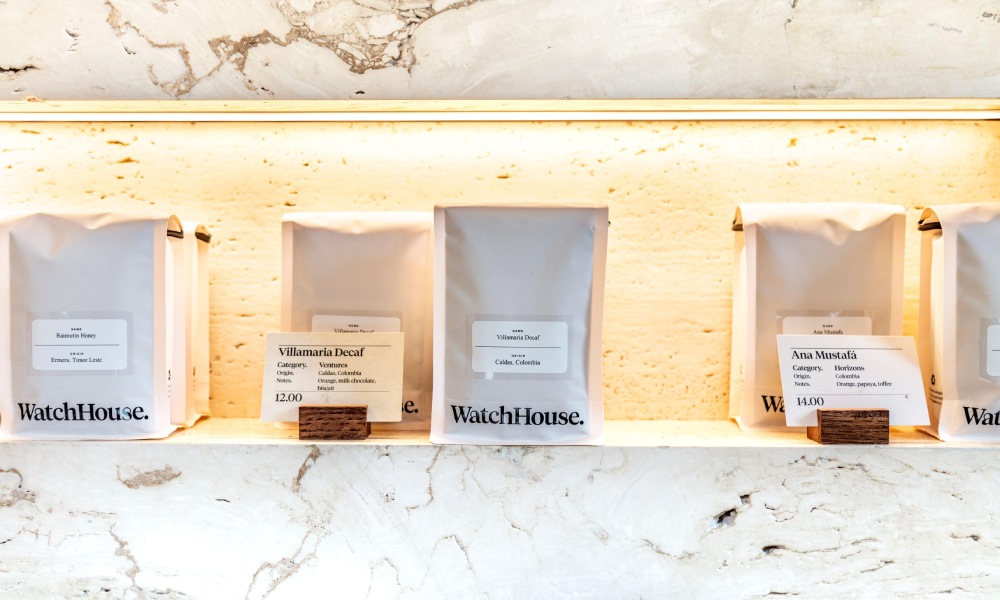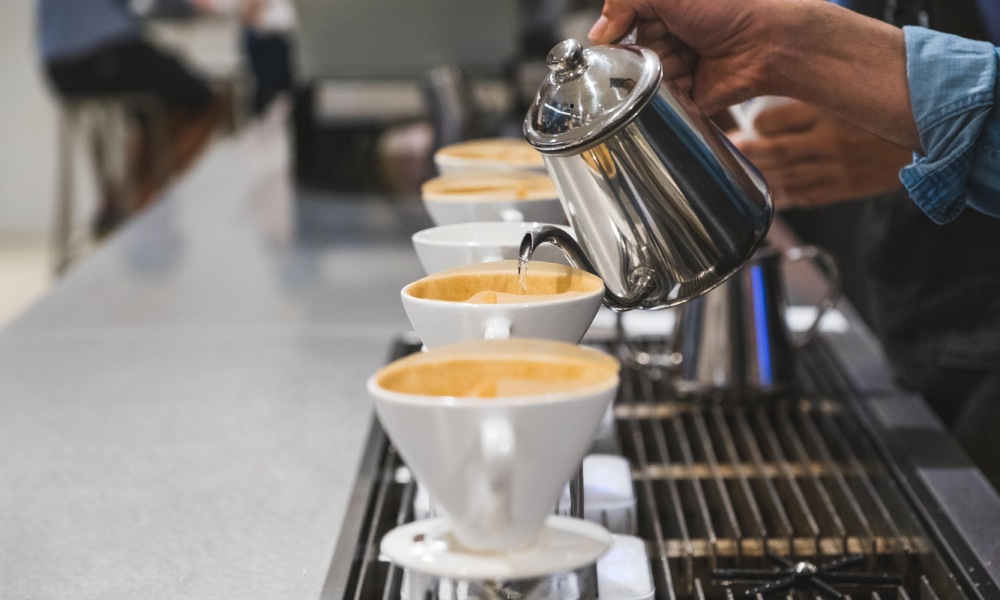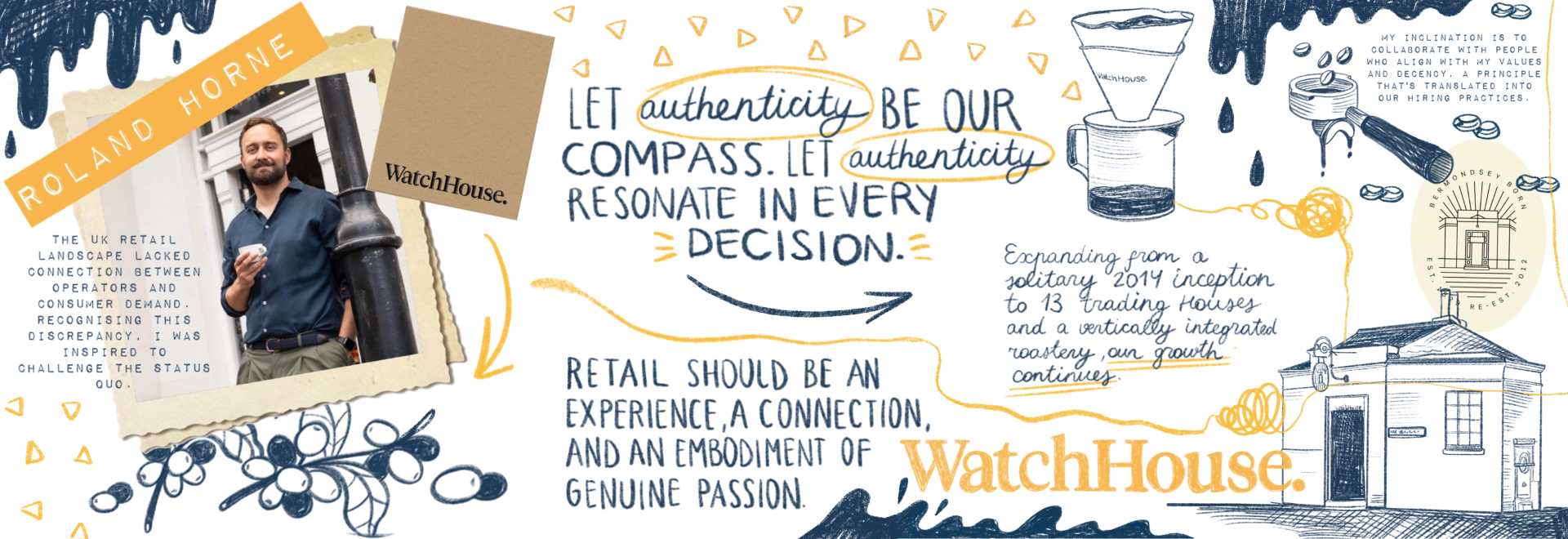How to maintain excellence when scaling a specialty coffee brand
Founder and CEO of WatchHouse, Roland Horne, tells us about his personal and professional experiences growing a specialty coffee company
In September 2014, I embarked on a journey into the industry, driven by my frustration as a disillusioned retail consumer. It wasn’t limited to coffee; rather, it encompassed my belief in redefining the retail experience in a truly authentic manner.
My travels to Australia, Japan, and South Korea further illuminated the stark contrast in retail authenticity back in the UK.
As an entrepreneur, the revelation was clear – crafting genuine experiences, spaces, and products that resonate with personal consumer desires was paramount.
The UK retail landscape lacked connection between operators and consumer demand. Recognising this discrepancy, I was inspired to challenge the status quo. It became my mission to disrupt the prevailing cookie-cutter approach driven solely by the bottom line.
Instead, we aimed to inject innovation and intrigue into our endeavours.
My vision was rooted in creating an environment where every aspect, from the ambience to the offerings, exuded an authenticity that I, as both operator and consumer, would seek.
This drive to bridge the gap between aspiration and execution led to a distinct shift in perspective – from mere transactions to forging connections and crafting memorable encounters.
In the early days, this pursuit of authenticity and uniqueness propelled our journey. We dared to be different, carving a path that diverged from conventional norms. The foundation of WatchHouse was laid on the premise that retail should be an experience, a connection, and an embodiment of genuine passion.
As we forged ahead, we aimed to redefine the very essence of retail, making it a place where consumer and creator came together in harmony, fueled by a shared desire for extraordinary, authentic encounters.

Seeking investment
Expanding from a single idea to 13 trading houses and a vertically integrated roastery, our growth continues. Several houses are under construction in central London and New York, with more in progress.
I’ve been asked once what are the main investments that an operator needs to make to scale in this sector, and I think the straight answer for this is culture.
The pandemic facilitated introspection, prompting a shift from an operational focus to culture and people. I acknowledge our earlier oversight as we aimed for excellence and progress. As the primary owner, my vision is to rectify market issues. However, lacking time for deep reflection hindered my intent.
This led me to pursue an executive MBA, aiming to strengthen my business acumen and understanding of “culture”. This journey urges introspection about my character – a healthy self-assessment for personal growth. It encourages consideration of actions taken and paths chosen.
In this context, I believe that the financial aspects of business, particularly in specialty coffee and hospitality, have become distorted. There are many cases of opportunistic manoeuvres and private equity involvement, leading to rapid expansion and abandonment.
This trend is inherent in the industry. There’s a scarcity of positive instances where businesses have embraced investments from ethical venture capitalists and private equity professionals.
Our aim is to defy this norm. Seeking to make a substantial impact, we pursued an investment. Engaging with several parties, we partnered with Edition Capital, a small venture capital firm based in central London.

Growth and improvement
One of the primary factors that has allowed us to grow successfully and sustainably is a solid foundation of people. Collaboratively, I’ve assembled a team that complements my weaknesses, fostering a mutually supportive environment.
My inclination is to work with people who align with my values, a principle that’s translated into our hiring practices. Our emphasis is on building a reflective and open environment, and being candid about our culture’s strengths and weaknesses.
Progress involves acknowledging shortcomings and actively enhancing them. I recognise the risks in scaling – the fear of diluting the unique energy and culture that define us.
There’s an evident correlation between growth and decline in some cases, but I’m encouraged by aspirational figures like James Freeman of Blue Bottle, who prioritised growth with excellence.
The UK hospitality scene emphasises maintaining initial quality, while Freeman’s approach was to surpass that notion. This perspective drives our ambition for growth while preserving our uniqueness.
As Blue Bottle expanded, they aimed for constant improvement. In the UK, there is a prevailing notion that growth could compromise initial quality. However, Blue Bottle’s view is that growth should lead to even higher standards.
The concept of improving while scaling holds significant importance to us. The available tools and opportunities – such as bringing in a head of people to refine culture and building operational frameworks, or a creative director to oversee creativity – become increasingly relevant.
In the earlier stages, there’s inherent magic and authenticity, which are fundamental sources of strength. However, these phases lack the capacity to thoroughly address resource-intensive aspects.
As a business expands, it gains the ability to improve these areas. Larger operations offer more opportunities to engage experts to determine the best approaches, ultimately enhancing efficiency and effectiveness.
Raising the entire company’s pay to a London Living Wage marked a substantial aspect of our re-evaluation. This involved not only adjusting costs, but also deeply examining the financial landscape within the industry.
And at the end of the day, investing in our workforce aligns with our ideals. Essentially, you’ve got to put your money where your mouth is, right?

Authenticity is key
In the context of a reset, from a hospitality perspective, there’s a multifaceted discussion underway. In a commercial context, prices have risen and are likely to continue climbing, challenging the race-to-the-bottom approach.
The era of extreme cost-cutting is fading; instead, businesses should either excel as low-cost operators or offer exceptional value that justifies higher prices.
If all goes well, local heroes are set to invest ethically and sustainably. Human interaction will remain essential – debunking the notion of complete virtual dominance.
The key advice for leaders is introspection and maintaining authentic human connections in this dynamic landscape. When facing challenges, let authenticity be our compass.
Reiterating its significance, opening a hospitality brand with grand aspirations requires authenticity. Embrace this principle. Engrave it on paper, let it adorn your walls, and let it guide you.
Authenticity, often repeated, isn’t mere rhetoric; it’s the keystone. When embarking on this journey, remember that being authentic, honest, and true isn’t just important – it’s paramount.
Amid aspirations of greatness, authenticity must remain steadfast, shaping not only our endeavours but also our character.
Let authenticity resonate in every decision, becoming the bedrock upon which we build remarkable legacies.







